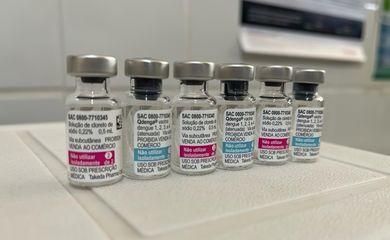Brazil to hold D-Day against dengue fever

Next Saturday (Mar. 2), the Ministry of Health, in partnership with Brazilian states and municipalities, will hold D-Day to combat dengue fever. With the theme “Brazil United against Dengue,” actions will be carried out to advise the population on how to prevent the spread of the disease.

"This period requires health authorities and the Ministry of Health to vigilantly monitor the situation in the country across various regions, states, and municipalities. It is also a time that demands unity not only among governments but also within society," stated Minister of Health Nísia Trindade during an interview addressing the current disease state in the country.
It has been disclosed, for instance, that Brazil could experience twice the number of dengue cases this year compared to 2023. The country has recorded 973,347 probable cases of the disease in 2024, with 7,771 classified as severe with warning signs. In 2023, the total number of cases for the entire year was 1,658,816.
"There has been a significant increase in severe cases, along with an atypical pattern emerging at the beginning of the year. Our assessment suggests that we may experience twice as many cases as last year, driven by the previous increase in 2023 and the impact of climate change, as well as the circulation of multiple dengue serotypes," stated the minister.
Lower lethality
However, lethality indicators are lower this year compared to 2023, as per data presented by the Ministry of Health. "In 2023, there were fewer severe cases but more deaths reported at this point," explained Health Surveillance Secretary Ethel Maciel.
The most affected age group in 2024 is between 20 and 49 years old, while severe cases are predominantly found in individuals over 70.
The highest number of dengue cases in Brazil so far has already exceeded the peak of 2023, which occurred between the end of March and the beginning of April. In 2023, the peak was 111,800 cases in epidemiological week 15. This year, however, the country had already reached 182,200 cases in week 6 (from February 4 to 10).
"We still don't know whether there will be a decline now, if that decline will be sustained, or whether it will be as rapid as the increase," stated the secretary.
Climate change
Minister Nísia Trindade highlighted climate change as a crucial factor in the heightened spread of dengue this year, attributing it to the hot and humid conditions that have favored mosquito proliferation. "2024 stands out as atypical, deviating from the patterns we have observed over the past 40 years of dengue epidemics," she remarked.
Another significant change this year is the circulation of all four dengue serotypes. In several states, where serotype 1 was predominant, there is now an increase in serotype 2, as people have developed immunity to the first serotype. This trend is evident in the Federal District, where 40 percent of cases are attributed to serotype 2.
In addition, this year the disease is being recorded in medium-sized and small towns, places where dengue infection has not previously occurred to this extent.
"Environmental factors, socio-behavioral factors—these demand the attention and involvement of society as a whole in the fight against dengue. Additionally, there are factors related to the virus's dynamics and variability, meaning that individuals who have not yet been exposed to certain virus types are susceptible," explained the minister.






